Ethical Scandals, Stakeholder Treatment, and Management at IKEA
VerifiedAdded on 2020/03/28
|8
|1392
|1024
Report
AI Summary
This report examines the ethical issues faced by IKEA, focusing on scandals such as the unethical treatment of truck drivers, the horsemeat scandal, and employee spying. It analyzes IKEA's response through its formulated values and sustainability strategies, encompassing environmental and community goals. The report identifies IKEA's key stakeholders—employees, suppliers, and the community—and assesses their ethical treatment, highlighting training programs, codes of ethics (IWAY), and partnerships with organizations like UNICEF. The analysis underscores the importance of transparency, employee engagement, supplier compliance, and community involvement in addressing ethical challenges and maintaining stakeholder trust.
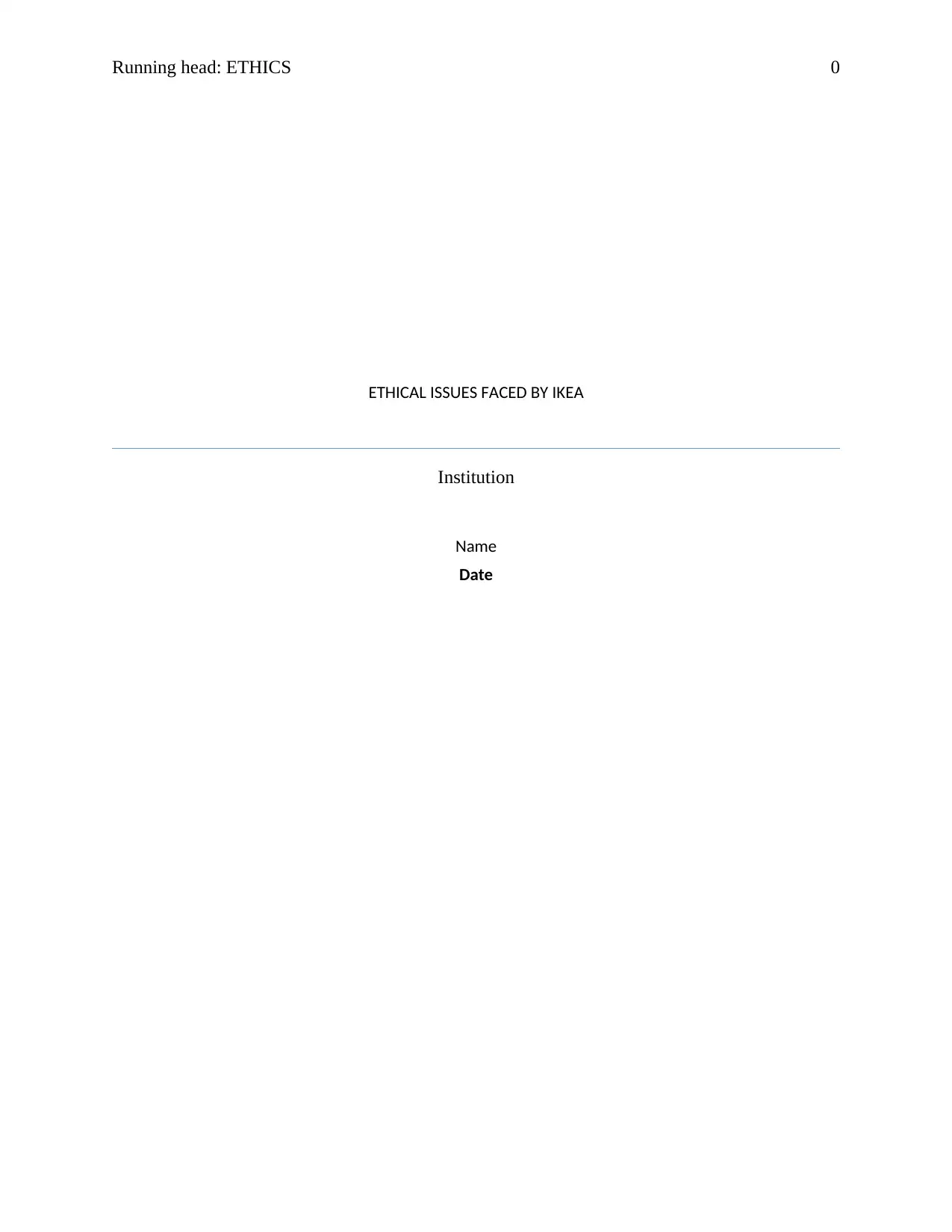
Running head: ETHICS 0
ETHICAL ISSUES FACED BY IKEA
Institution
Name
Date
ETHICAL ISSUES FACED BY IKEA
Institution
Name
Date
Paraphrase This Document
Need a fresh take? Get an instant paraphrase of this document with our AI Paraphraser
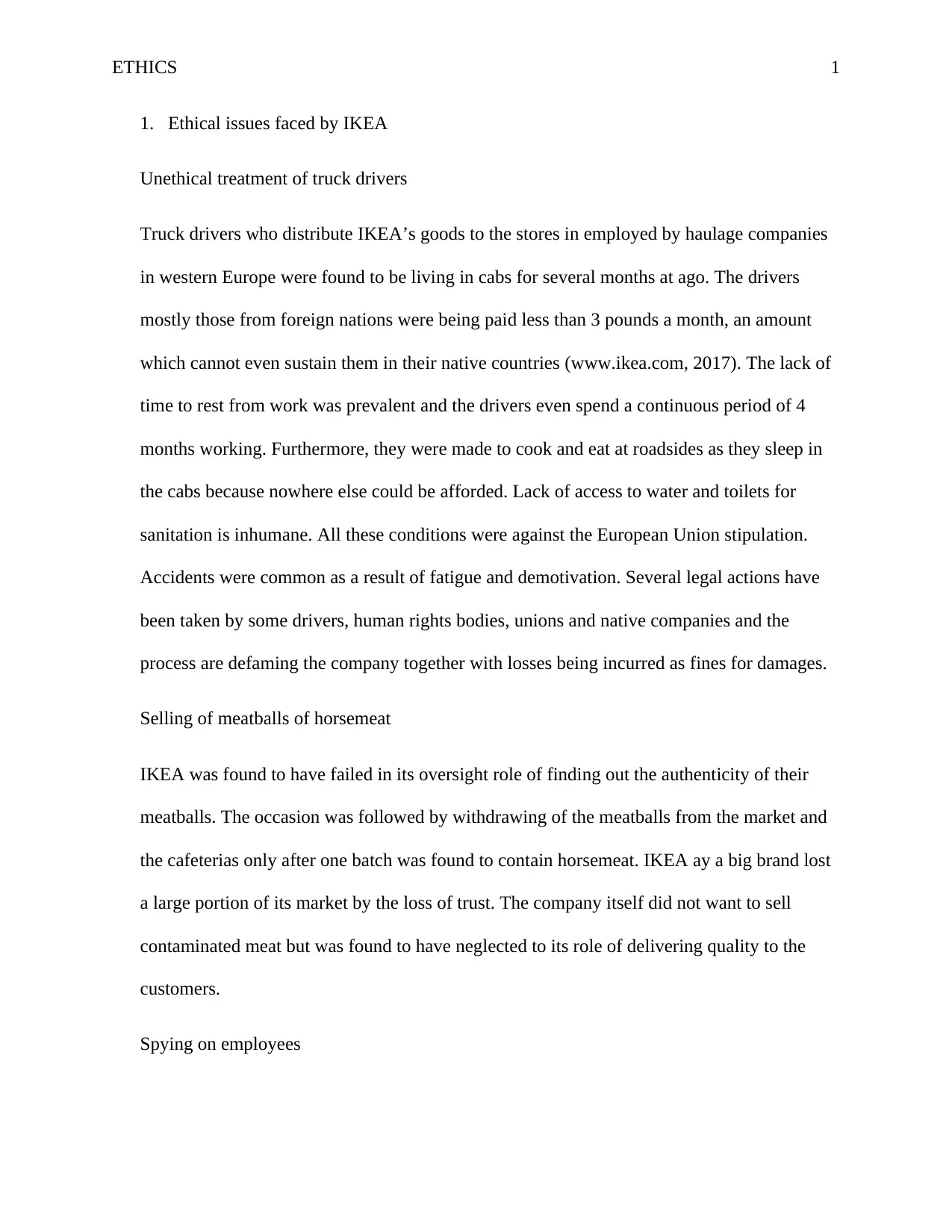
ETHICS 1
1. Ethical issues faced by IKEA
Unethical treatment of truck drivers
Truck drivers who distribute IKEA’s goods to the stores in employed by haulage companies
in western Europe were found to be living in cabs for several months at ago. The drivers
mostly those from foreign nations were being paid less than 3 pounds a month, an amount
which cannot even sustain them in their native countries (www.ikea.com, 2017). The lack of
time to rest from work was prevalent and the drivers even spend a continuous period of 4
months working. Furthermore, they were made to cook and eat at roadsides as they sleep in
the cabs because nowhere else could be afforded. Lack of access to water and toilets for
sanitation is inhumane. All these conditions were against the European Union stipulation.
Accidents were common as a result of fatigue and demotivation. Several legal actions have
been taken by some drivers, human rights bodies, unions and native companies and the
process are defaming the company together with losses being incurred as fines for damages.
Selling of meatballs of horsemeat
IKEA was found to have failed in its oversight role of finding out the authenticity of their
meatballs. The occasion was followed by withdrawing of the meatballs from the market and
the cafeterias only after one batch was found to contain horsemeat. IKEA ay a big brand lost
a large portion of its market by the loss of trust. The company itself did not want to sell
contaminated meat but was found to have neglected to its role of delivering quality to the
customers.
Spying on employees
1. Ethical issues faced by IKEA
Unethical treatment of truck drivers
Truck drivers who distribute IKEA’s goods to the stores in employed by haulage companies
in western Europe were found to be living in cabs for several months at ago. The drivers
mostly those from foreign nations were being paid less than 3 pounds a month, an amount
which cannot even sustain them in their native countries (www.ikea.com, 2017). The lack of
time to rest from work was prevalent and the drivers even spend a continuous period of 4
months working. Furthermore, they were made to cook and eat at roadsides as they sleep in
the cabs because nowhere else could be afforded. Lack of access to water and toilets for
sanitation is inhumane. All these conditions were against the European Union stipulation.
Accidents were common as a result of fatigue and demotivation. Several legal actions have
been taken by some drivers, human rights bodies, unions and native companies and the
process are defaming the company together with losses being incurred as fines for damages.
Selling of meatballs of horsemeat
IKEA was found to have failed in its oversight role of finding out the authenticity of their
meatballs. The occasion was followed by withdrawing of the meatballs from the market and
the cafeterias only after one batch was found to contain horsemeat. IKEA ay a big brand lost
a large portion of its market by the loss of trust. The company itself did not want to sell
contaminated meat but was found to have neglected to its role of delivering quality to the
customers.
Spying on employees
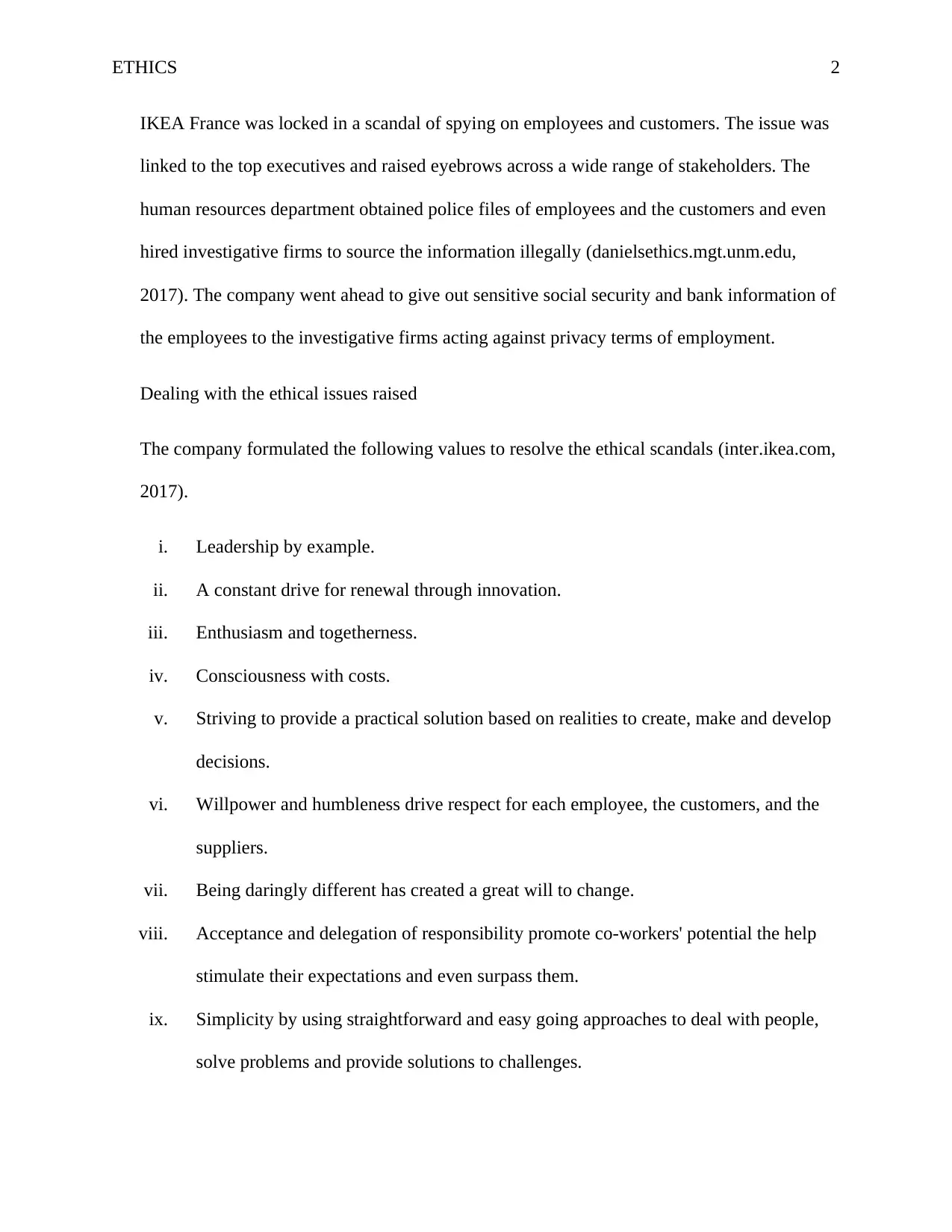
ETHICS 2
IKEA France was locked in a scandal of spying on employees and customers. The issue was
linked to the top executives and raised eyebrows across a wide range of stakeholders. The
human resources department obtained police files of employees and the customers and even
hired investigative firms to source the information illegally (danielsethics.mgt.unm.edu,
2017). The company went ahead to give out sensitive social security and bank information of
the employees to the investigative firms acting against privacy terms of employment.
Dealing with the ethical issues raised
The company formulated the following values to resolve the ethical scandals (inter.ikea.com,
2017).
i. Leadership by example.
ii. A constant drive for renewal through innovation.
iii. Enthusiasm and togetherness.
iv. Consciousness with costs.
v. Striving to provide a practical solution based on realities to create, make and develop
decisions.
vi. Willpower and humbleness drive respect for each employee, the customers, and the
suppliers.
vii. Being daringly different has created a great will to change.
viii. Acceptance and delegation of responsibility promote co-workers' potential the help
stimulate their expectations and even surpass them.
ix. Simplicity by using straightforward and easy going approaches to deal with people,
solve problems and provide solutions to challenges.
IKEA France was locked in a scandal of spying on employees and customers. The issue was
linked to the top executives and raised eyebrows across a wide range of stakeholders. The
human resources department obtained police files of employees and the customers and even
hired investigative firms to source the information illegally (danielsethics.mgt.unm.edu,
2017). The company went ahead to give out sensitive social security and bank information of
the employees to the investigative firms acting against privacy terms of employment.
Dealing with the ethical issues raised
The company formulated the following values to resolve the ethical scandals (inter.ikea.com,
2017).
i. Leadership by example.
ii. A constant drive for renewal through innovation.
iii. Enthusiasm and togetherness.
iv. Consciousness with costs.
v. Striving to provide a practical solution based on realities to create, make and develop
decisions.
vi. Willpower and humbleness drive respect for each employee, the customers, and the
suppliers.
vii. Being daringly different has created a great will to change.
viii. Acceptance and delegation of responsibility promote co-workers' potential the help
stimulate their expectations and even surpass them.
ix. Simplicity by using straightforward and easy going approaches to deal with people,
solve problems and provide solutions to challenges.
⊘ This is a preview!⊘
Do you want full access?
Subscribe today to unlock all pages.

Trusted by 1+ million students worldwide
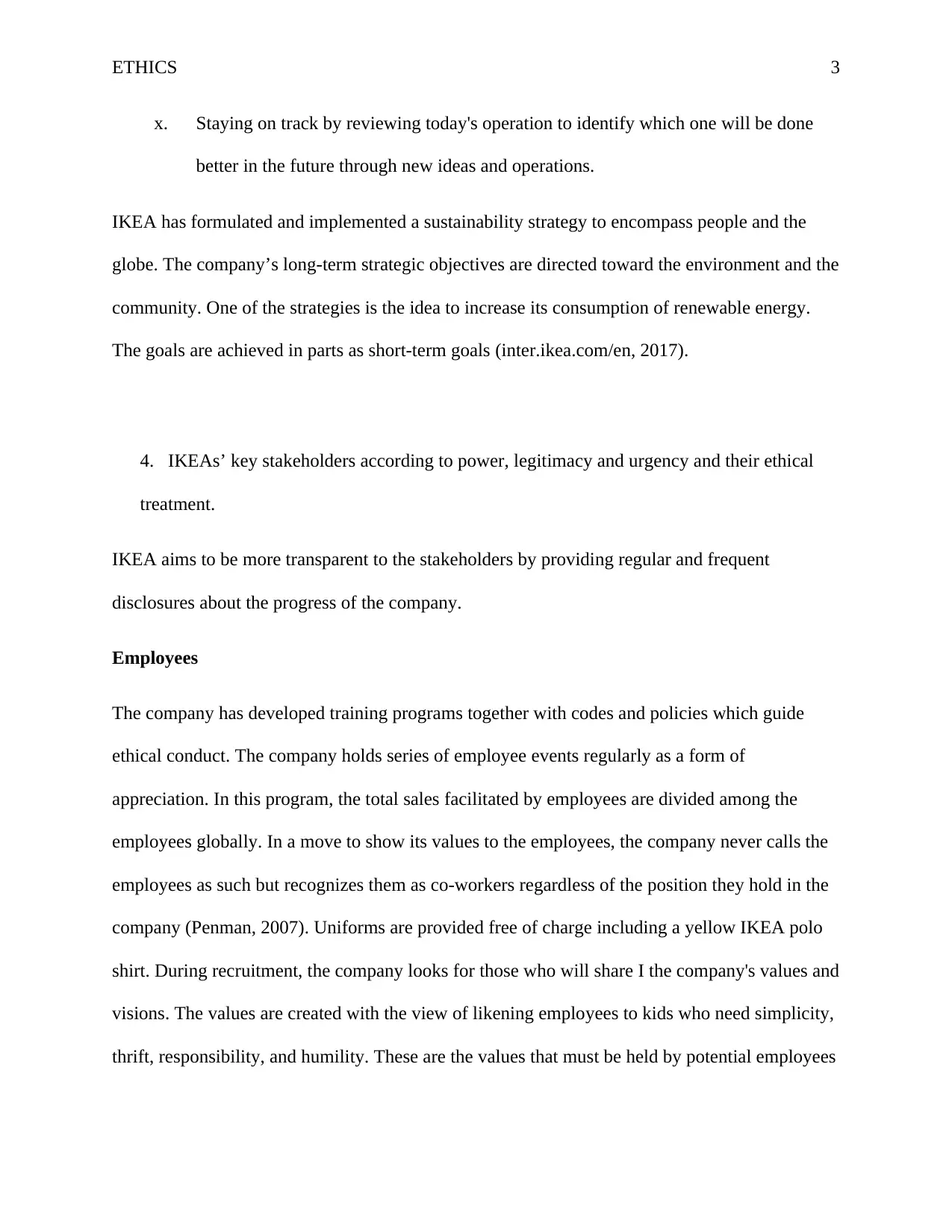
ETHICS 3
x. Staying on track by reviewing today's operation to identify which one will be done
better in the future through new ideas and operations.
IKEA has formulated and implemented a sustainability strategy to encompass people and the
globe. The company’s long-term strategic objectives are directed toward the environment and the
community. One of the strategies is the idea to increase its consumption of renewable energy.
The goals are achieved in parts as short-term goals (inter.ikea.com/en, 2017).
4. IKEAs’ key stakeholders according to power, legitimacy and urgency and their ethical
treatment.
IKEA aims to be more transparent to the stakeholders by providing regular and frequent
disclosures about the progress of the company.
Employees
The company has developed training programs together with codes and policies which guide
ethical conduct. The company holds series of employee events regularly as a form of
appreciation. In this program, the total sales facilitated by employees are divided among the
employees globally. In a move to show its values to the employees, the company never calls the
employees as such but recognizes them as co-workers regardless of the position they hold in the
company (Penman, 2007). Uniforms are provided free of charge including a yellow IKEA polo
shirt. During recruitment, the company looks for those who will share I the company's values and
visions. The values are created with the view of likening employees to kids who need simplicity,
thrift, responsibility, and humility. These are the values that must be held by potential employees
x. Staying on track by reviewing today's operation to identify which one will be done
better in the future through new ideas and operations.
IKEA has formulated and implemented a sustainability strategy to encompass people and the
globe. The company’s long-term strategic objectives are directed toward the environment and the
community. One of the strategies is the idea to increase its consumption of renewable energy.
The goals are achieved in parts as short-term goals (inter.ikea.com/en, 2017).
4. IKEAs’ key stakeholders according to power, legitimacy and urgency and their ethical
treatment.
IKEA aims to be more transparent to the stakeholders by providing regular and frequent
disclosures about the progress of the company.
Employees
The company has developed training programs together with codes and policies which guide
ethical conduct. The company holds series of employee events regularly as a form of
appreciation. In this program, the total sales facilitated by employees are divided among the
employees globally. In a move to show its values to the employees, the company never calls the
employees as such but recognizes them as co-workers regardless of the position they hold in the
company (Penman, 2007). Uniforms are provided free of charge including a yellow IKEA polo
shirt. During recruitment, the company looks for those who will share I the company's values and
visions. The values are created with the view of likening employees to kids who need simplicity,
thrift, responsibility, and humility. These are the values that must be held by potential employees
Paraphrase This Document
Need a fresh take? Get an instant paraphrase of this document with our AI Paraphraser
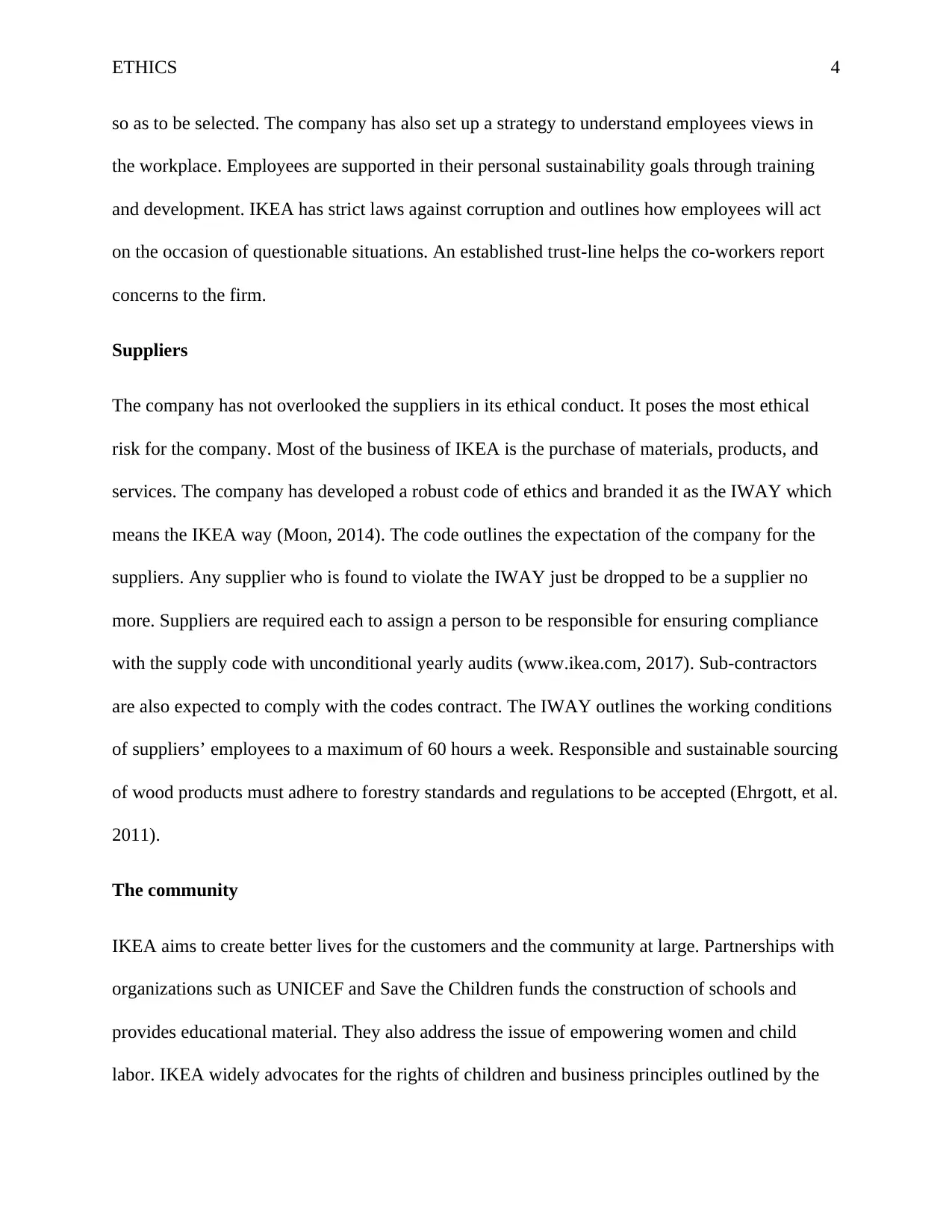
ETHICS 4
so as to be selected. The company has also set up a strategy to understand employees views in
the workplace. Employees are supported in their personal sustainability goals through training
and development. IKEA has strict laws against corruption and outlines how employees will act
on the occasion of questionable situations. An established trust-line helps the co-workers report
concerns to the firm.
Suppliers
The company has not overlooked the suppliers in its ethical conduct. It poses the most ethical
risk for the company. Most of the business of IKEA is the purchase of materials, products, and
services. The company has developed a robust code of ethics and branded it as the IWAY which
means the IKEA way (Moon, 2014). The code outlines the expectation of the company for the
suppliers. Any supplier who is found to violate the IWAY just be dropped to be a supplier no
more. Suppliers are required each to assign a person to be responsible for ensuring compliance
with the supply code with unconditional yearly audits (www.ikea.com, 2017). Sub-contractors
are also expected to comply with the codes contract. The IWAY outlines the working conditions
of suppliers’ employees to a maximum of 60 hours a week. Responsible and sustainable sourcing
of wood products must adhere to forestry standards and regulations to be accepted (Ehrgott, et al.
2011).
The community
IKEA aims to create better lives for the customers and the community at large. Partnerships with
organizations such as UNICEF and Save the Children funds the construction of schools and
provides educational material. They also address the issue of empowering women and child
labor. IKEA widely advocates for the rights of children and business principles outlined by the
so as to be selected. The company has also set up a strategy to understand employees views in
the workplace. Employees are supported in their personal sustainability goals through training
and development. IKEA has strict laws against corruption and outlines how employees will act
on the occasion of questionable situations. An established trust-line helps the co-workers report
concerns to the firm.
Suppliers
The company has not overlooked the suppliers in its ethical conduct. It poses the most ethical
risk for the company. Most of the business of IKEA is the purchase of materials, products, and
services. The company has developed a robust code of ethics and branded it as the IWAY which
means the IKEA way (Moon, 2014). The code outlines the expectation of the company for the
suppliers. Any supplier who is found to violate the IWAY just be dropped to be a supplier no
more. Suppliers are required each to assign a person to be responsible for ensuring compliance
with the supply code with unconditional yearly audits (www.ikea.com, 2017). Sub-contractors
are also expected to comply with the codes contract. The IWAY outlines the working conditions
of suppliers’ employees to a maximum of 60 hours a week. Responsible and sustainable sourcing
of wood products must adhere to forestry standards and regulations to be accepted (Ehrgott, et al.
2011).
The community
IKEA aims to create better lives for the customers and the community at large. Partnerships with
organizations such as UNICEF and Save the Children funds the construction of schools and
provides educational material. They also address the issue of empowering women and child
labor. IKEA widely advocates for the rights of children and business principles outlined by the
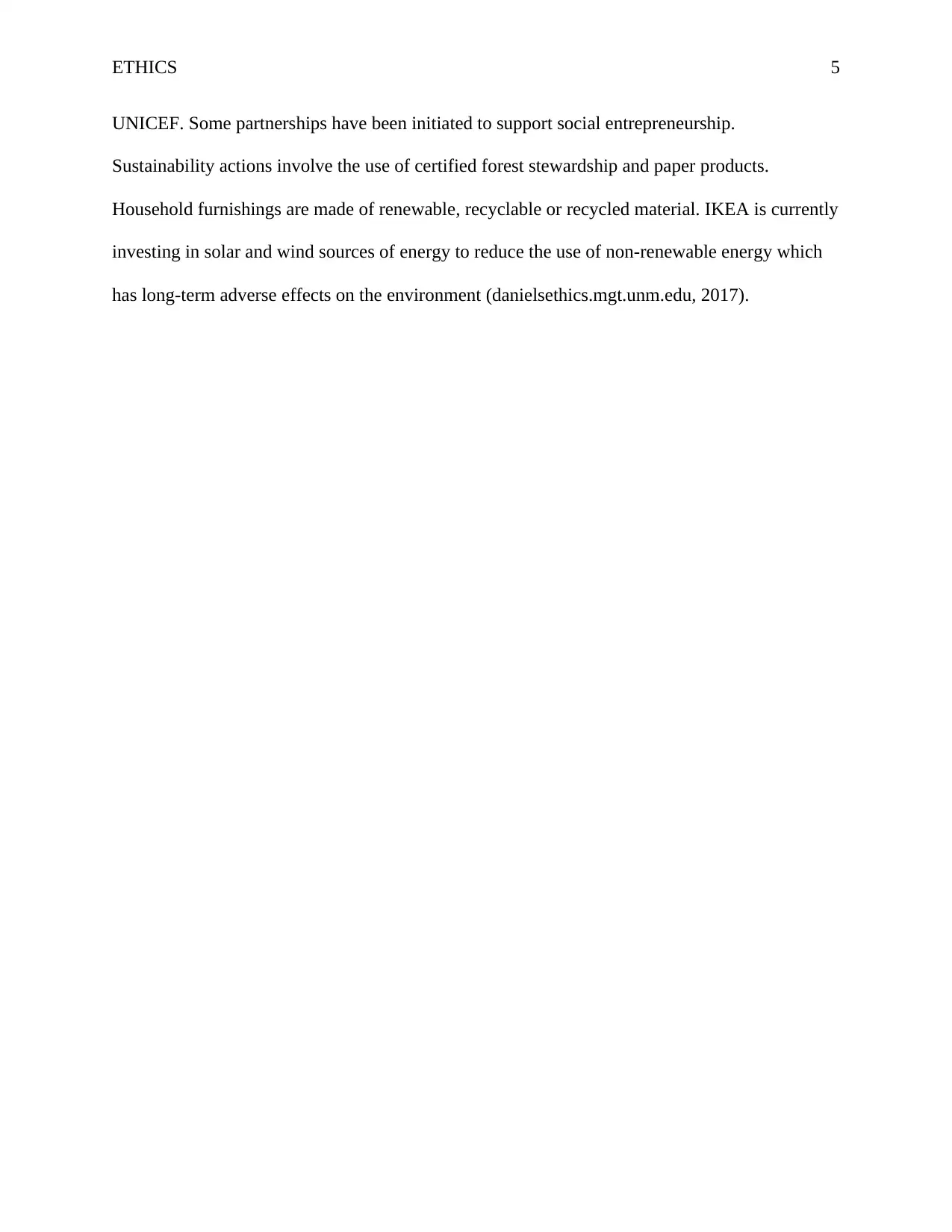
ETHICS 5
UNICEF. Some partnerships have been initiated to support social entrepreneurship.
Sustainability actions involve the use of certified forest stewardship and paper products.
Household furnishings are made of renewable, recyclable or recycled material. IKEA is currently
investing in solar and wind sources of energy to reduce the use of non-renewable energy which
has long-term adverse effects on the environment (danielsethics.mgt.unm.edu, 2017).
UNICEF. Some partnerships have been initiated to support social entrepreneurship.
Sustainability actions involve the use of certified forest stewardship and paper products.
Household furnishings are made of renewable, recyclable or recycled material. IKEA is currently
investing in solar and wind sources of energy to reduce the use of non-renewable energy which
has long-term adverse effects on the environment (danielsethics.mgt.unm.edu, 2017).
⊘ This is a preview!⊘
Do you want full access?
Subscribe today to unlock all pages.

Trusted by 1+ million students worldwide
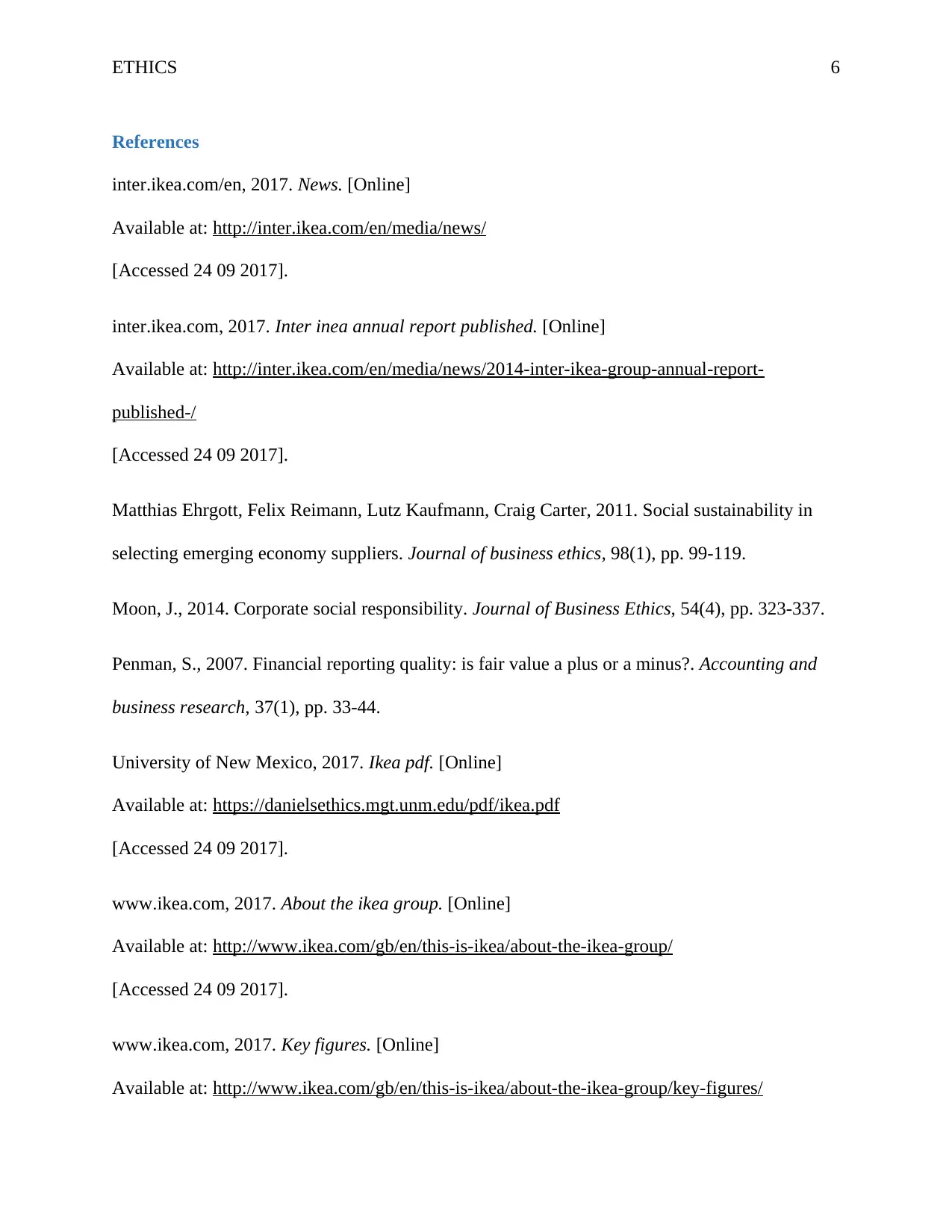
ETHICS 6
References
inter.ikea.com/en, 2017. News. [Online]
Available at: http://inter.ikea.com/en/media/news/
[Accessed 24 09 2017].
inter.ikea.com, 2017. Inter inea annual report published. [Online]
Available at: http://inter.ikea.com/en/media/news/2014-inter-ikea-group-annual-report-
published-/
[Accessed 24 09 2017].
Matthias Ehrgott, Felix Reimann, Lutz Kaufmann, Craig Carter, 2011. Social sustainability in
selecting emerging economy suppliers. Journal of business ethics, 98(1), pp. 99-119.
Moon, J., 2014. Corporate social responsibility. Journal of Business Ethics, 54(4), pp. 323-337.
Penman, S., 2007. Financial reporting quality: is fair value a plus or a minus?. Accounting and
business research, 37(1), pp. 33-44.
University of New Mexico, 2017. Ikea pdf. [Online]
Available at: https://danielsethics.mgt.unm.edu/pdf/ikea.pdf
[Accessed 24 09 2017].
www.ikea.com, 2017. About the ikea group. [Online]
Available at: http://www.ikea.com/gb/en/this-is-ikea/about-the-ikea-group/
[Accessed 24 09 2017].
www.ikea.com, 2017. Key figures. [Online]
Available at: http://www.ikea.com/gb/en/this-is-ikea/about-the-ikea-group/key-figures/
References
inter.ikea.com/en, 2017. News. [Online]
Available at: http://inter.ikea.com/en/media/news/
[Accessed 24 09 2017].
inter.ikea.com, 2017. Inter inea annual report published. [Online]
Available at: http://inter.ikea.com/en/media/news/2014-inter-ikea-group-annual-report-
published-/
[Accessed 24 09 2017].
Matthias Ehrgott, Felix Reimann, Lutz Kaufmann, Craig Carter, 2011. Social sustainability in
selecting emerging economy suppliers. Journal of business ethics, 98(1), pp. 99-119.
Moon, J., 2014. Corporate social responsibility. Journal of Business Ethics, 54(4), pp. 323-337.
Penman, S., 2007. Financial reporting quality: is fair value a plus or a minus?. Accounting and
business research, 37(1), pp. 33-44.
University of New Mexico, 2017. Ikea pdf. [Online]
Available at: https://danielsethics.mgt.unm.edu/pdf/ikea.pdf
[Accessed 24 09 2017].
www.ikea.com, 2017. About the ikea group. [Online]
Available at: http://www.ikea.com/gb/en/this-is-ikea/about-the-ikea-group/
[Accessed 24 09 2017].
www.ikea.com, 2017. Key figures. [Online]
Available at: http://www.ikea.com/gb/en/this-is-ikea/about-the-ikea-group/key-figures/
Paraphrase This Document
Need a fresh take? Get an instant paraphrase of this document with our AI Paraphraser
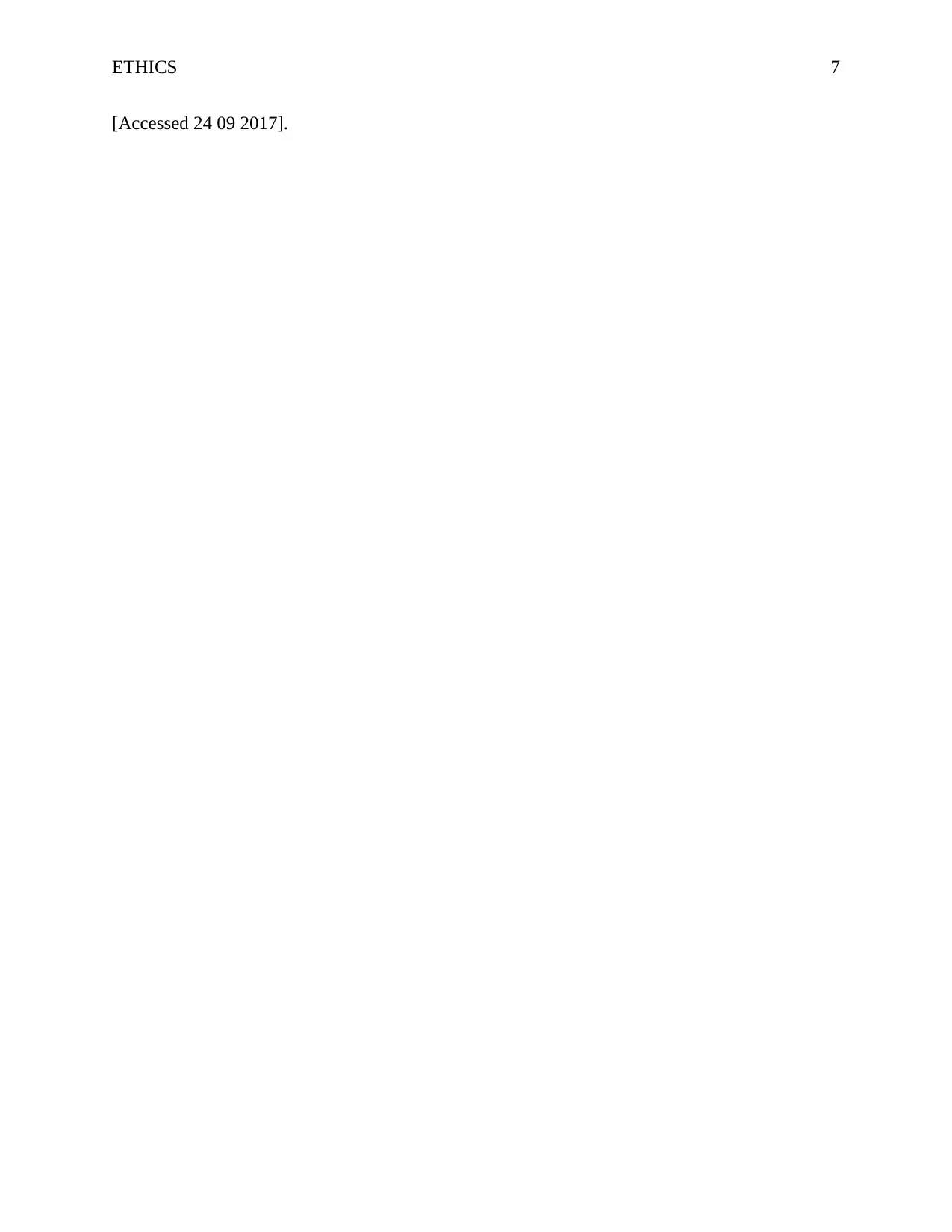
ETHICS 7
[Accessed 24 09 2017].
[Accessed 24 09 2017].
1 out of 8
Your All-in-One AI-Powered Toolkit for Academic Success.
+13062052269
info@desklib.com
Available 24*7 on WhatsApp / Email
![[object Object]](/_next/static/media/star-bottom.7253800d.svg)
Unlock your academic potential
Copyright © 2020–2026 A2Z Services. All Rights Reserved. Developed and managed by ZUCOL.
